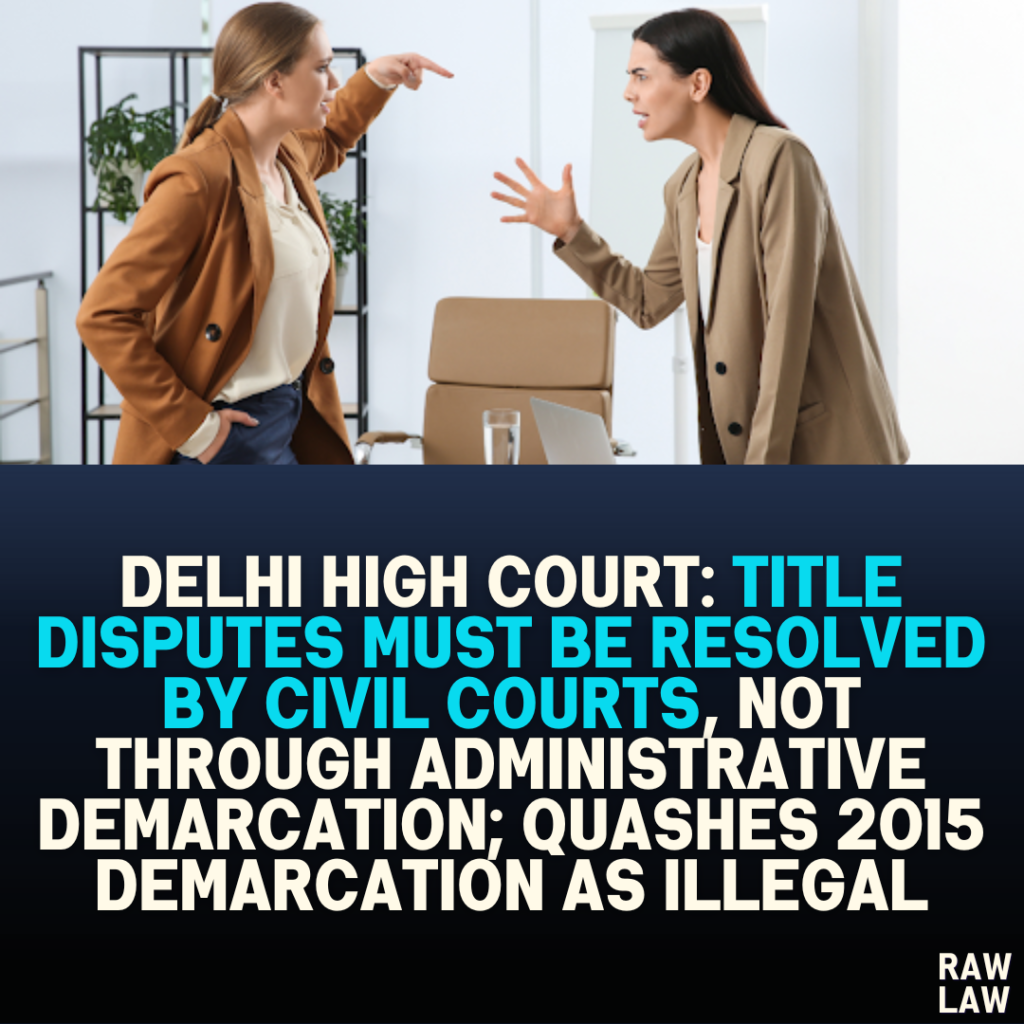Court’s Decision:
The Delhi High Court quashed the demarcation report dated 23.11.2015 and held that the subsequent demarcation exercise conducted on 26.06.2015, along with the associated notices and public actions, was illegal. The court ruled that the petitioner’s earlier demarcation from 12.05.1998 stood valid and unchallenged. Furthermore, it found that the notices issued in April 2014 did not pertain to the petitioner or the subject land.
Facts:
The petitioner, a company, lawfully acquired ownership of land in Village Asola, New Delhi, through five registered sale deeds dated 23.12.1987. A demarcation report was issued on 12.05.1998 confirming the boundaries of the land. However, in 2014, the Forest Department initiated action, claiming the land as forest land and subsequently demolished a portion of the boundary wall without proper notice to the petitioner. A fresh demarcation exercise was conducted on 26.06.2015, which was contrary to the earlier 1998 demarcation.
Issues:
Whether the fresh demarcation exercise and the report of 23.11.2015 were valid.
Whether the notices and demolition actions carried out by the Forest Department in 2014 were lawful.
Whether the petitioner’s possession and ownership based on the 1998 demarcation report could be disturbed by subsequent demarcation exercises.
Petitioner’s Arguments:
The petitioner argued that the demarcation report dated 12.05.1998 was valid and had not been challenged by any authority or party.
The actions of the respondents in demolishing the boundary wall and conducting a fresh demarcation were arbitrary and illegal, as no valid notice was served.
The subsequent demarcation was carried out without their participation and violated the settled demarcation of the property.
Respondent’s Arguments:
The respondents claimed that the petitioner had alternative remedies available under the Delhi Land Revenue Act, 1954, and the writ petition was not maintainable.
The demarcation in 2015 was part of a larger effort to reclaim encroached forest land in compliance with Supreme Court orders.
The initial 1998 demarcation was manual, and the later exercise using the Total Station Method (TSM) was more accurate.
Analysis of the Law:
The court analyzed the provisions of the Indian Forest Act, 1927, and the Delhi Land Revenue Act, 1954. It determined that the notices issued by the respondents did not pertain to the subject land in Khasra Nos. 1922/1314 and 1315 and were therefore invalid. The court further held that the demarcation exercise conducted in 1998 had attained finality and could not be arbitrarily disturbed after 17 years without proper notice or legal process.
Precedent Analysis:
The court referenced previous judgments related to demarcation disputes and forest land notifications. It relied on established principles that title disputes must be resolved by civil courts, not through demarcation exercises carried out by administrative authorities.
Court’s Reasoning:
The court emphasized that the petitioner had validly acquired the land and that the 1998 demarcation report, which had never been challenged, stood final. The fresh demarcation in 2015 was deemed illegal because it was conducted without issuing a valid show-cause notice to the petitioner. Furthermore, the respondents’ claim that the land was forest land was unsupported by any evidence, and the public notices referred to different parcels of land.
Conclusion:
The court quashed the notices issued in 2014 and the subsequent demarcation report of 23.11.2015. It affirmed that the demarcation conducted in 1998 was valid and that the petitioner remained the lawful owner and possessor of the land.
Implications:
This judgment reinforces the principle that administrative authorities cannot arbitrarily disturb long-settled land demarcations without following due legal processes. It also underscores the need for proper notice and participation of affected parties in any re-demarcation exercise.




Pingback: Patna HC Dismisses Petition for Assistant Professor Position in Chemistry, Rules Non-Submission of Ph.D. Certificate Within Stipulated Timeframe Makes Candidature Invalid - Raw Law
Pingback: Delhi High Court Dismisses Petition Against Review of Inquiry Report and Maintains Tribunal's Transfer Order: "If Grievance Exists, It Constitutes Fresh Cause of Action" - Raw Law
Pingback: Karnataka High Court: Arbitrary Removal of Chairman of Karnataka State Pollution Control Board Set Aside for Violation of Natural Justice - Raw Law